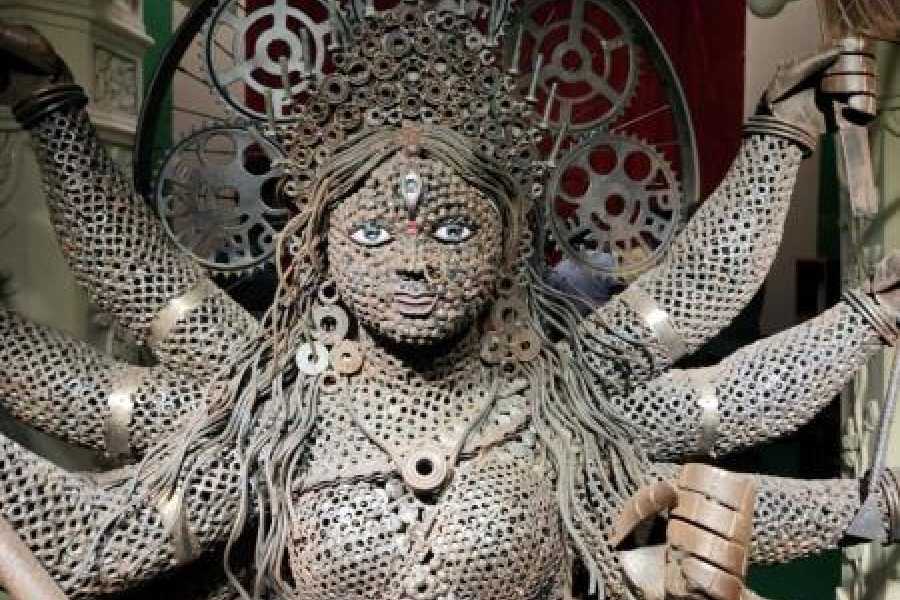Discarded cycle tyres were part of the decor in one pandal. In another, chairs that have gone out of use became a part of the theme. Yet another recreated a slice
of the Sunderbans to tell people how mindless tourism was destroying the mangrove haven.
Many Durga Puja organisers chose the occasion to raise awareness about sustainable living, upcycling and recycling.
At Maitri Sangha in Lansdowne’s Motilal Nehru Road, an idol of Durga has been made of scrap iron. There is a separate clay idol that is being worshipped.
The pandal also has sofas made of discarded tyres of cycles, two-wheelers and cars. The glass covers of the lights used in the pandal were made from doors of washing machines that were defunct or thrown away.
Many of the items on display at the pandal were taken from the campuses of the iLEAD college.
“Our campuses and even my own flat have items that were made from discarded products. When the Puja organisers approached me, I told them that Durga Puja has the highest footfall and attention and they should use this opportunity to raise awareness about upcyling and recycling,” said Pradip Chopra, chairman of iLEAD.
Ronitesh Chakraborty, cultural secretary of Maitri Sangha, said they were happy to be able to tell people that much of what is thrown away can be used in so many other ways.
The puja in Salt Lake’s CE Block recreated a slice of the Sunderbans to send home the message of sustainable living and responsible tourism.
Debashis Sen, president of the association, said they selected this theme to tell visitors that “devastating recreational tourism was destroying the Sunderbans in many ways”.
Mangrove saplings and a clay idol of Bonobibi, the deity worshipped in the villages in the mangroves, are among the items procured from the Sunderbans. “I have seen picnickers blaring songs on ferries in Sajnekhali. We have to realise that our activities are putting the actual residents of the Sunderbans in more danger,” said Sen.
“Honey collectors are dying after being attacked by tigers because they have
to go deeper into the forest for collection. This mindless tourism is destroying the ecosystem so much that the collectors have to take greater risks and go deeper into the forest.”
The organisers brought nearly 2,000 mangrove saplings to the pandal. Sourav Mukherjee of Kolkata Society for Sustainable Heritage, which helped the organisers procure the saplings and the idol of Bonobibi, said the saplings would be planted on a green verge in CE Block.
Ballygunge Cultural Association, a top draw among pujas in south Kolkata, had their pandal made of discarded cans of soft drinks and baby food containers. “We have shown that stuff that are thrown away can be used in so many other ways,” said Anjan Ukil, joint secretary of the Puja committee.
Bosepukur Sitala Mandir has used 12,000 chairs in the pandal, ones that have gone out of use. Kajal Sarkar, secretary of Bosepukur Sitala Mandir Durgotsav Committee, said the chairs have iron frames. The seating and backrest are made of stitched plastic threads.
